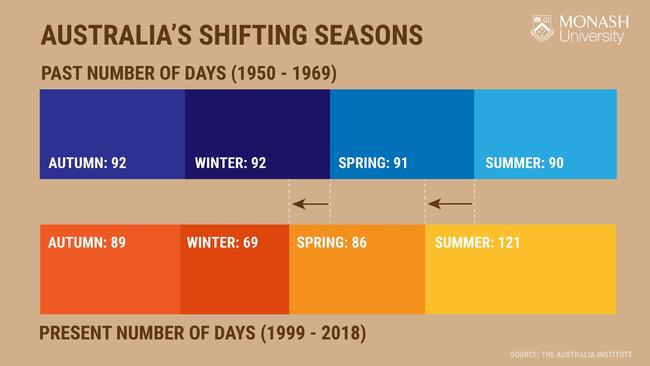Record heat and torrential rain shake up autumn
We're well into autumn, but high summer temperatures seem to be sticking around, as climate change blurs the boundaries between our seasons.

Hyperlocal
Don't miss out on the headlines from Hyperlocal. Followed categories will be added to My News.
Autumn came in hot with the first three days of March each warmer than any March day on record.
This March was Australia's hottest on record – around 2.4C above average – beating the previous record set in 2019 by 0.4C.
March 1 that stole the show, recording a scorching national average temperature of 38.7C.
The records didn't stop there.
Australia's average maximum temperature was around 2.3C warmer than usual, the second-warmest on record, while the average minimum temperature was 2.5C higher than normal making it the hottest on record.

Here in Queensland, our March minimum temperature was around 2.7C warmer than average – the highest ever recorded.
Zooming in on Charleville, we can see changes too.
The average nighttime temperature in March is now around 3.8C warmer than it was back in the early 1970s.

Shifting seasons
Climate change is causing our summers to grow, with the season now beginning around mid-November and lasting until mid-March.
And that means the cool autumn change we expect is taking longer to land on our doorsteps.
On average, Australian summers are now around 30 days longer than they were just 70 years ago.
If we just look at Brisbane, the city now experiences around 11 more summer days, with the season now coming to an end around March 6.

While it might mean more beach time and backyard BBQ's for us, these long summers put pressure on our already struggling reefs and wildlife.
Soaked or starved of rain
Just because it's been hot doesn't mean there hasn't been some serious rain.
March rainfall wasaverage or above average for most of Australia.
It was Queensland's third-wettest March since 1900, with large parts of the state experiencing severe flooding.
Brisbane was drenched by its wettest day in 50 years in the wake of Ex-tropical Cyclone Alfred, and large parts of western Queensland received up to four times their March average rainfall.
In fact, from March 23-26, many regions across southern and south-western Queensland had more than their yearly average rainfall.
Other parts of Australia have experienced quite the opposite.
Adelaide for example has had less rain this year than the outback town of Coober Pedy.
Coober Pedy has received almost 49mm of rain since the start of 2025, while Adelaide has only seen around 14mm.
Looking ahead, rainfall is likely to be above average across most of northern Australia, extending down into north-east NSW.
In contrast, the southern half of Western Australia and much of South Australia is likely to experience drier than usual conditions.
Cooling it on the change
Climate change is the main driver behind the hotter temperatures and extreme weather we've been facing.
And these conditions are only expected to become more frequent and intense as emissions rise.
But we can all do our bit to keep temperatures in check.
Small changes like walking or cycling for short commutes keep us fit and healthy, limit spending on fuel and help reduce emissions.
Buying locally-grown produce also makes a big difference, supporting small businesses and keeping the distance from farm to table much shorter.
Plus the local farms market is a great way to get inspiration for tasty autumnal recipes.
So while this Autumn might feel more like summer, making simple changes today can help bring seasons back into sync.
Want more information on how your climate is changing? Check out the last article in this series.
Amelia Pearson is the Operations Manager at the Monash Climate Change Communication Research Hub.
This column is part of a collaboration between Monash University and News Corp to deliver hyperlocal weather and climate information.

